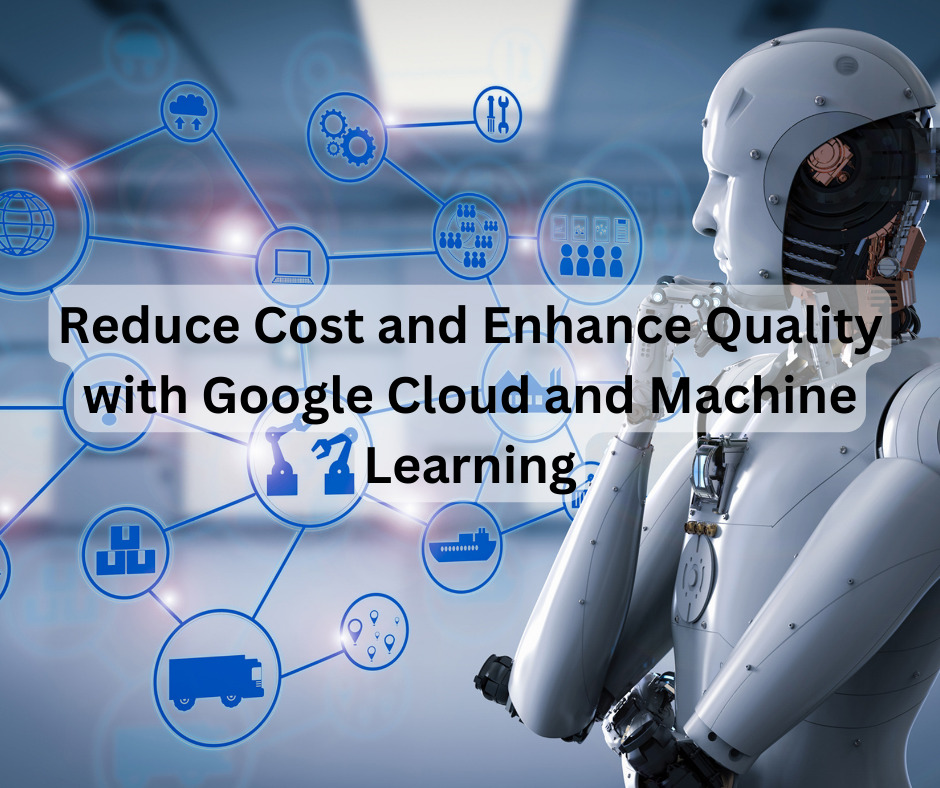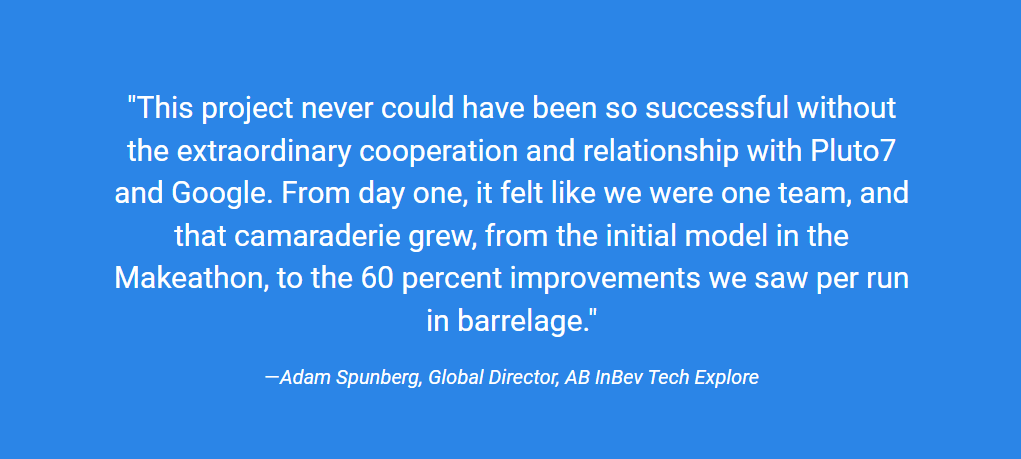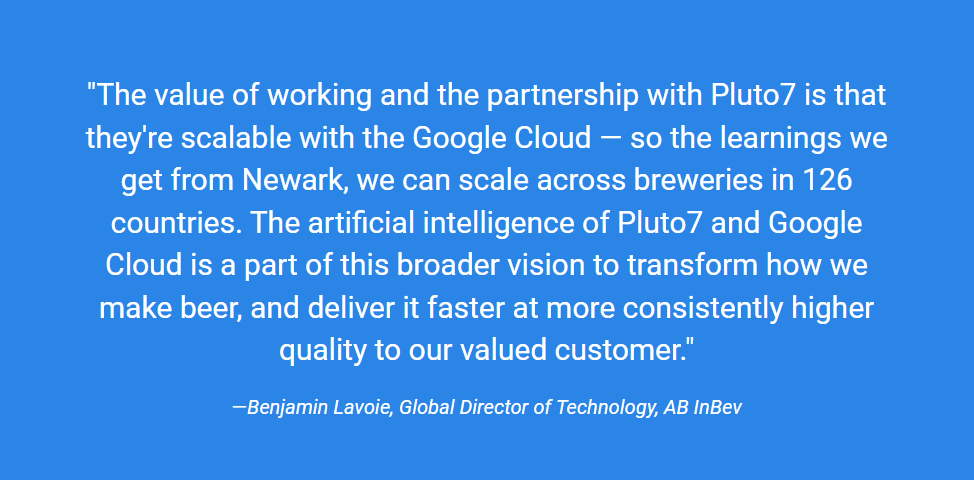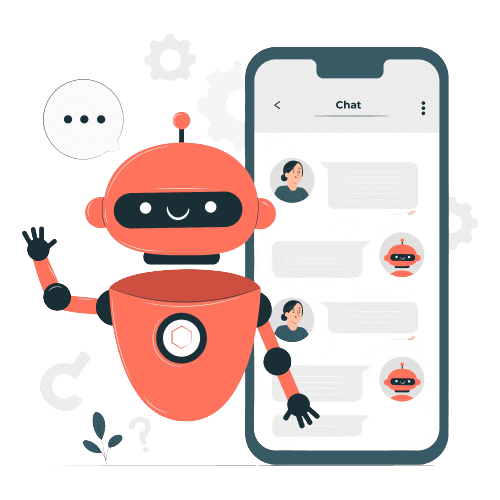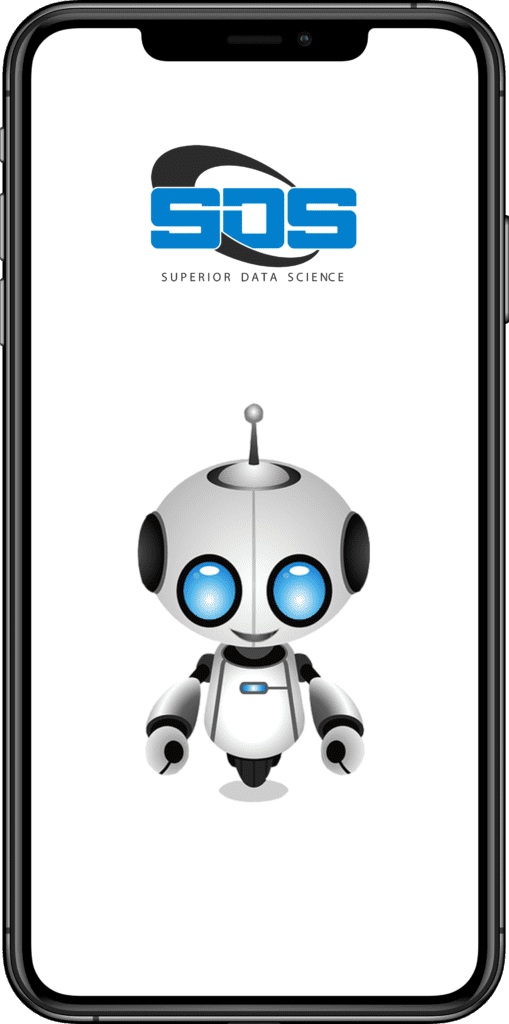Introduction
In the fiercely competitive manufacturing landscape, optimizing costs and maintaining high product quality are paramount for success. Embracing innovative technologies like Google Cloud and machine learning presents an opportunity for manufacturers to revolutionize their operations, driving efficiency gains and quality improvements. This case study delves into how a leading manufacturer, achieved significant cost reductions and quality enhancements through the adoption of Google Cloud and machine learning solutions.
Challenges Faced:
Companies encountered several challenges in their manufacturing processes, including:
- High Production Costs: Rising material and labor costs were impacting profitability.
- Quality Control Issues: Inconsistencies in product quality led to increased rework and customer dissatisfaction.
- Operational Inefficiencies: Manual processes and siloed data hindered operational agility and decision-making.
- Predictive Maintenance: Lack of predictive maintenance capabilities resulted in unexpected downtime and increased maintenance costs.
Solution:
To address these challenges, organizations partner with Google Cloud to implement a comprehensive solution leveraging machine learning capabilities:
- Data Integration: Google Cloud Platform (GCP) was utilized to consolidate data from various sources, including IoT sensors, production equipment, and enterprise systems.
- Predictive Analytics: Machine learning models were developed to analyze historical data and predict equipment failures, enabling proactive maintenance scheduling to prevent costly downtime.
- Quality Control: Machine learning algorithms were deployed to analyze production data in real-time, identifying patterns and anomalies to improve quality control processes.
- Cost Optimization: GCP’s cost management tools were utilized to optimize resource allocation and minimize waste across the manufacturing value chain.
Results:
The implementation of Google Cloud and machine learning solutions yielded significant results:
- Cost Reduction: By optimizing production processes and implementing predictive maintenance strategies, Companies achieved a massive reduction in manufacturing costs.
- Improved Quality: Real-time analysis of production data enables organizations to identify and address quality issues proactively, resulting in a decrease in product defects.
- Enhanced Efficiency: Automation of manual processes and data-driven decision-making improved operational efficiency, reducing lead times and enhancing overall productivity.
- Predictive Maintenance: With predictive maintenance capabilities, a company minimizes equipment downtime, resulting in increased production uptime and reduced maintenance costs.
AB InBev: With Machine Learning, This Bud’s For You
AB InBev is reducing manufacturing costs and improving the quality of its beer by using Google Cloud including machine learning.
Google Cloud Results
- Increases the barrelage per run by 60% through longer filter runs
- Reduces costs of filtration
- Delivers the best possible beer taste through machine learning
- Stays competitive by adopting the latest tech for manufacturing
What goes into refining the taste of beer? Malt, hops, rice, yeast, water — and machine learning (ML).
Anheuser-Busch InBev (AB InBev) makes some of the world’s oldest and most popular beer brands — including Budweiser, Corona, and Stella Artois. But the global corporation is all about embracing the future and innovating to stay competitive. That’s how AB InBev came to partner with Pluto7, a technology solutions provider that uses Google Cloud services to improve operations at manufacturers and other companies.
Pluto7 developed a prototype solution that is enabling AB InBev to optimize the beer filtration process with much greater accuracy — reducing costs, increasing efficiencies, and perhaps most importantly for beer aficionados, ensuring taste. The Pluto7 solution combines TensorFlow, Cloud Machine Learning Engine, Cloud SQL, and BigQuery.
Working with Pluto7, the AB InBev team evaluated six months of manufacturing data from its Newark, New Jersey brewery. The data was fed into a TensorFlow ML engine run through Google Cloud. “We studied the potential impact variables and matched them relentlessly against previous data from the brewery’s filtration process, taking advantage of the supersonic speed of Cloud Machine Learning Engine and its capability to analyze at a far swifter and comprehensive rate,” says Adam Spunberg, Global Director, Tech Explore, the AB InBev in-house technology group and part of the company’s Tech Supply Program. “Through that process, we honed in on more than 50 specific parameters that displayed potential predictive ability, and we leveraged the highest coefficients among those to revolutionize our system.”
“This project never could have been so successful without the extraordinary cooperation and relationship with Pluto7 and Google,” Adam says. “From day one, it felt like we were one team, and that camaraderie grew, from the initial model in the Makeathon, to the 60 percent improvements we saw per run in barrelage.”
The success that AB InBev has achieved with Pluto7’s help and Google technology is also getting other people’s attention. AB InBev was recently showcased at the 2018 Google Cloud Next conference in San Francisco and selected as a Finalist for the Supply Chain Breakthrough of the Year awards at Gartner’s 2019 SCM World conference.
Optimizing beer filtration
A top priority at AB InBev is optimizing the K Filter that kicks in at the end of beer brewing, right before packaging. The filtration process removes any remaining yeast, proteins, or other elements to achieve the best, crispest beer taste and meet brand-required turbidity levels.
Beer filtration is a complicated process with many unpredictable variables, such as the fluid’s turbidity coming into and going out of the filter as well as regulating pressure in and across the filter. The technology long in place to manipulate the variables is capable of only basic logic, using meters to monitor and react to adverse conditions, such as a change in pressure. Adding ML and artificial intelligence (AI), the company can leverage a much larger dataset to better predict and prevent potential issues during filtration. Consequently, an ML-enabled filtration process could deliver great-tasting beer with significant cost efficiencies. Recognizing this potential set AB InBev on a search for the best partnership and provider that would enable the company to deploy ML quickly and effectively.
A month-long Makeathon
The AB InBev Tech Explore team had been actively exploring how AI and ML could solve some of the company’s top, ongoing business challenges. In late 2017, the incubator held a Makeathon, inviting providers of ML and AI solutions to participate. During the month-long bake-off, 14 solutions providers developed Proofs of Concept (POCs) that addressed the challenges that AB InBev needed to solve. Each technology provider was encouraged to develop a solution to 1 of the 12 use cases that would best showcase their capabilities.
Tech Explore collaborated with Google for the event. During the Makeathon, multiple Google Cloud partners developed solutions for the K Filter challenge, knowing it was among three priorities identified at AB InBev. Developing chatbots and improving video analytics were the other two.
Currently, AB InBev is working with Pluto7 to determine the best way to scale the solution to multiple brewery locations. Over time, the plan is to deploy the solution at 12 AB InBev breweries in the United States and at all K Filter and similar filtration systems globally.
“The value of working and the partnership with Pluto7 is that they’re scalable with the Google Cloud — so the learnings we get from Newark, we can scale across breweries in 126 countries,” says Benjamin Lavoie, Global Director of Technology at AB InBev. “The artificial intelligence of Pluto7 and Google Cloud is a part of this broader vision to transform how we make beer, and deliver it faster at more consistently higher quality to our valued customer.”
Endless possibilities
In many ways, beer-making relies on traditional manufacturing processes. But AB InBev is open to shaking things up. “AB InBev is thinking a year or two ahead of its industry,” says Manjunath Devadas, Founder & CEO, Pluto7. “They’re serious about exploring how technology can improve the manufacturing process in ways never before possible.”
“Based on the success in the K Filter project, we have already identified several more AI ML opportunities that are perfect fits for this partnership,” adds Adam. “The K Filter optimization project was so critical and valuable because it showed the business how transformative AI can be and won us support and buy-in going forward.”
Adds Pat Fagan, Senior Quality Manager for AB InBev: “Knowing that whenever someone opens up a Budweiser, machine learning played a role in how it tastes? That’s cool.”
Conclusion:
By harnessing the power of Google Cloud and machine learning, a Company successfully transforms its manufacturing operations, achieving significant cost reductions and quality improvements. The adoption of innovative technologies not only enhances operational efficiency but also positions the Company for long-term success in an increasingly competitive market. As manufacturers continue to embrace digital transformation, the integration of Google Cloud and machine learning offers immense opportunities for driving innovation and achieving sustainable growth.



